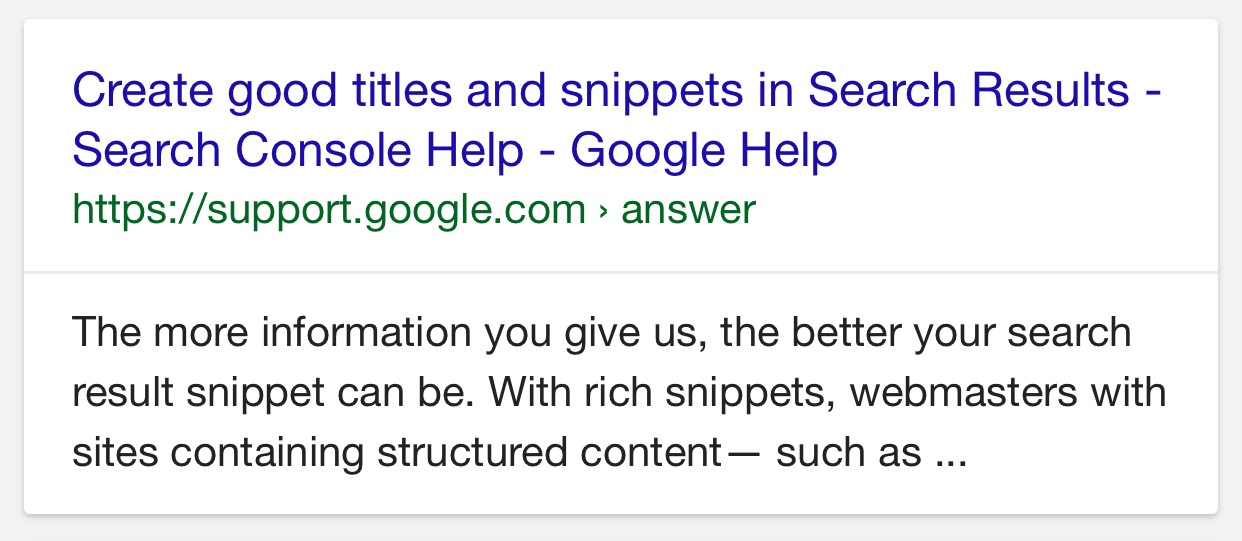2017 年 6 月 2 日,星期五
在购买图书之前,人们喜欢先大致确定自己是否愿意花费几个小时的时间来阅读它。他们会看看概要、前言甚至序章,以确定自己会不会喜欢这本书。
搜索结果摘要也大抵如此;它们可帮助人们判断相应摘要所属的网页是否值得自己投入时间进行阅读。

搜索结果摘要的描述性和相关性越强,人们就越有可能会点击相应链接并对所转到的网页感到满意。以前,搜索结果摘要有 3 个来源:
- 网页内容
- 元描述
- DMOZ 详情
网页内容无疑是搜索结果摘要的首选来源,而且可提取的内容往往与人们的查询最相关。但有时,内容本身并不是搜索结果摘要的最佳来源。例如,当某人搜索某出版公司以查找其出版的图书时,搜索结果集中的相关首页可能会只包含几张描述相关业务的图片和一个徽标,也可能会包含一些链接,但这些内容都不是特别适合用作搜索结果摘要。
如果网页内容中没有充足的文字内容可用于生成搜索结果摘要,元描述便是情理之中的备用方式。元描述应当是非常简短的说明,仅使用几个字词便能精准地描述网页内容。
最后,如果网页内容中没有充足的文字内容可用于生成搜索结果摘要,并且元描述缺失、与网页无关或质量低劣,我们会使用 DMOZ(又称为“开放式目录管理系统”)作为备用方式。十多年来,我们一直依赖 DMOZ 来生成搜索结果摘要,因为就质量而言,DMOZ 摘要往往会优于网站站长在元描述中提供的摘要,而就描述性而言,DMOZ 摘要又往往会优于网页内容。
遗憾的是,由于 DMOZ 现已被停用,我们已无法再使用其详情生成搜索结果摘要。因此,如果不能向网页中添加更多内容,网站站长提供精准元描述就会显得更加重要了。
怎样才算是精准的元描述?
精准的元描述应当是能对网页内容进行准确描述的简短说明。它们像宣传标语一样,旨在让用户确信相应网页正是他们要找的网页。如需获取更多提示,请参阅我们针对该主题发布的这篇便用的帮助中心文章。请务必确保您的桌面版网页和移动版网页都包含标题和元描述。
在元描述方面有哪些最常见的问题?
由于元描述通常只对搜索引擎和其他软件可见,所以网站站长有时会忘记它们(会将其完全留空)。出于同样的原因,在多个(有时是许多个)网页中使用相同元描述的现象也很常见。另一方面,描述完全偏离主题、质量低劣或纯属垃圾内容的问题亦比较常见。这些问题会破坏用户的搜索体验,因此我们倾向于忽略此类元描述。
元描述有字符数上限吗?
元描述没有长度限制,但 Google 会在必要时截断搜索结果摘要(通常是为了适应设备宽度)。
NOODP robots 规则会怎样?
由于 DMOZ (ODP) 已被停用,我们已不再依赖其数据,因此 NOODP 规则已成为空操作。
我可以阻止 Google 使用网页内容作为搜索结果摘要吗?
您可以通过指定 nosnippet robots 规则来彻底阻止 Google 生成搜索结果摘要。
但无法在阻止使用网页内容作为搜索结果摘要的同时允许使用其他来源。
和往常一样,如果您有任何问题,请在论坛中提问或前往 Twitter 与我们联系!
